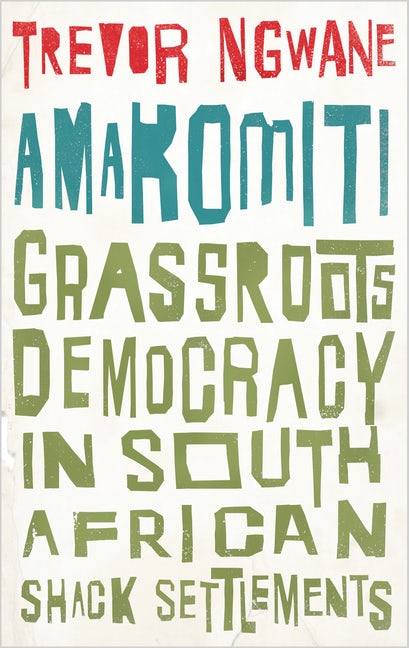18 November 2021, 1PM EST (NYC), 8PM SAST (Johannesburg)
Please join author Trevor Ngwame as he discusses his book Amakomiti: Grassroots Democracy in South African Shack Settlements with Peter Hitchcock and Ashley Dawson.

In a study conducted in dozens of South Africa’s shack settlements, where more than 9 million people live, Trevor Ngwane finds thriving shack dwellers’ committees that govern local life, are responsive to popular needs and provide a voice for the community. These committees, called ‘amakomiti’ in the Zulu language, organize the provision of basic services such as water, sanitation, public works and crime prevention especially during settlement establishment.
Amakomiti argues that, contrary to common perception, slum dwellers are in fact an essential part of the urban population, whose political agency must be recognized and respected. In a world searching for democratic alternatives that serve the many and not the few, it is to the shantytowns, rather than the seats of political power, that we should turn.
Trevor Ngwane is a scholar activist from anti-apartheid days to the present. He obtained his PhD (Sociology) at the University of Johannesburg (UJ). He has a long history of activism in various civil society organisations including the trade unions, political formations and social movements in South Africa. He is a senior lecturer at the Sociology Department, director of the Centre for Sociological Research and Practice, both at UJ, and deputy-president of the South African Sociological Association.
Ashley Dawson is currently Professor of Postcolonial Studies in the English Department at the Graduate Center, City University of New York (CUNY), and at the College of Staten Island/CUNY. He currently works in the fields of environmental humanities and postcolonial ecocriticism. He is the author of three recent books relating to these fields: People’s Power (O/R, 2020), Extreme Cities (Verso, 2017) and Extinction (O/R, 2016).
Peter Hitchcock is Professor of English at Baruch College and the Graduate Center of the City University of New York. He is also on the faculties of Women’s Studies and Film Studies at the GC. He is the author of six books, including The Long Space, for Stanford University Press and Labor in Culture for Palgrave. He has also co-edited and introduced three books, Biotheory, The Debt Age, and The New Public Intellectual. Recent publications include, “Exceptional Biometrics” in Valur Ingimundarson and Svenn M. Jóhannesson, eds., Liberal Disorder, States of Exception, and Populist Politics. London: Routledge, 2021; “’The Collier’s Small, Mean Head’” Symplokē 28: 1-2, 2020; “Literature of the World, Unite!” in Jeffery Di Leo, ed., Philosophy as World Literature. London: Bloomsbury, 2020; “Canons and Canonicity in Anglophone Literature” in Stefan Helgesson et al. Handbook of Anglophone World Literatures. Berlin: De Gruyter, 2020; “Cyborg Affect and the Power of the Posthuman in the Ghost in the Shell Franchise” in Christopher Breu and Elizabeth A. Hatmaker, eds., Noir Affect. New York: Fordham University Press, 2020; “A World in ‘Small Hands’? Globalization as Risk and Rights” in Alexandra S. Moore and Samantha Pinto, eds, Writing Beyond the State. London: Palgrave, 2020; “Commonists Like Us” minnesota review, 93 (2019); “Novelization in Decolonization, or, Postcolonialism Reconsidered” in Simon Ferdinand, Irene Villaescusa-Illan, and Esther Peeren, eds. Other Globes: Past and Peripheral Imaginations of Globalization. New York: Palgrave Macmillan, 2019; “History and Class Struggle” in Jeff Diamanti, Andrew Pendakis and Imre Szeman, eds. The Bloomsbury Companion to Marx. London: Bloomsbury, 2019; and “Resistance is Futile: The Cultural Politics of Transformation in the Digital Age.” The Comparatist 42 (2018).



